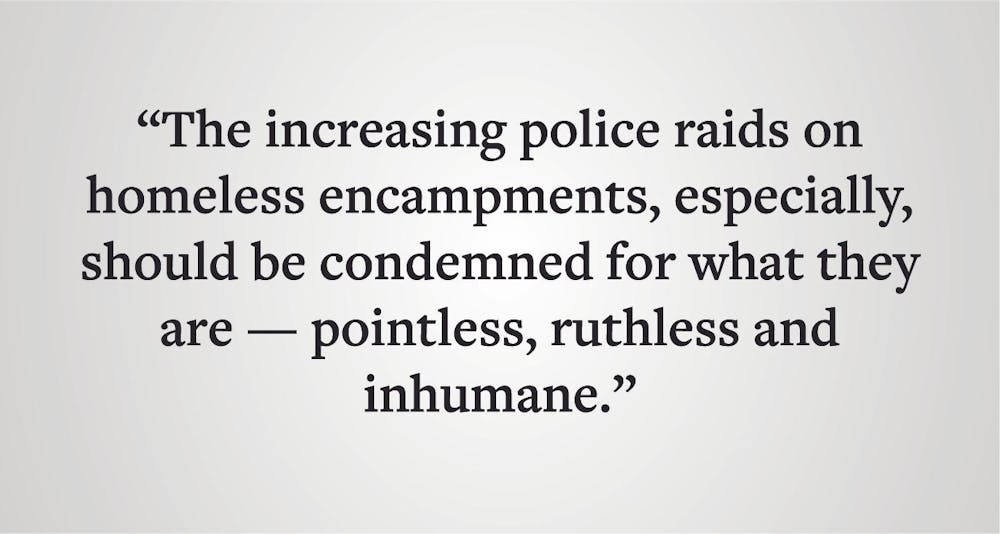In the past five years, homelessness in Rhode Island has more than doubled, and unsheltered homelessness has almost increased fivefold. In 2024, 2,442 Rhode Islanders were experiencing homelessness. In response to this crisis, there has been a significant increase in police presence and crackdowns on homeless encampments around Providence and Rhode Island. As recently as August, Cranston Mayor Ken Hopkins signed an executive order allowing Cranston police to break up homeless encampments. In December, West Warwick enacted a ban on encampments on town properties.
All of this is not happening in isolation but as part of a national push to criminalize homelessness. The recent Supreme Court ruling in Grants Pass v. Johnson held that it does not violate the Eighth Amendment prohibition on cruel and unusual punishment to ban individuals from sleeping outdoors even if they have nowhere else to go.
It is crucial to recognize the utter cruelty of such treatment of homelessness, both at the local and national level. The increasing police raids on homeless encampments, especially, should be condemned for what they are — pointless, ruthless and inhumane.
Clearing encampments is simply not a solution to the homelessness crisis. Shelter spaces are not always guaranteed or offered when people are displaced from encampments. In January, Governor McKee commented that there are shelter beds available for anyone who calls, a claim that housing advocates quickly pointed out as outright false. But even if shelter beds were always guaranteed, not everyone experiencing homelessness would choose to sleep in shelters over the outdoors in the first place, due to concerns relating to safety, privacy or substance use. Clearing encampments will not necessarily help homeless people find adequate shelter but rather will continually displace homeless communities out of the public’s sight.
The Rhode Island Homeless Bill of Rights, the first of its kind in the country, states that homeless people “have the right to a reasonable expectation of privacy of personal property.” Police raids, however, regularly violate this. Not only do the raids often leave tents unusable, but they also fail to return vitally important personal items such as social security cards, government IDs, cell phones and medication. This is especially concerning because people experiencing homelessness often face many barriers in obtaining such items in the first place.
Removing people, whether they are housed or unhoused, from the place in which they live can be a deeply traumatic and damaging experience. Police raids also make consistent outreach efforts much more difficult. Once people are displaced, outreach workers have difficulty reconnecting with them, especially as homeless people often lack access to phones and the internet in the first place. This is especially troublesome, for instance, for professional outreach workers who work to offer overdose prevention medication to homeless people.
Solving the homelessness crisis requires a series of solutions, many of which local housing advocates continue to push for: rent stabilization policies to address rent increases, the advancement of tenant rights such as protections for Just Cause Evictions to prevent further arbitrary displacement of people, a public state developer of affordable housing and constructions of “tiny home” homeless shelters like ECHO village, which recently opened after a significant delay.
But we also desperately need measures that protect people who are already experiencing homelessness. Examples of this include the proposed ordinance by City Councilor Miguel Sanchez (Ward 6) to ban camping fines for people who are experiencing homelessness, or last year’s proposed amendment to R.I.’s Homeless Bill of Rights that sought to impose fines on those who actively violate the rights of homeless individuals. Such efforts must be applauded. We must proactively make our voices heard to local officials to condemn police raids and harassment, and to ask them to support legislation that aims to bar such cruel actions.
San Kwon ’25, Ayla Kattler ’27, Remi Takahashi ’28 can be reached at san_kwon@brown.edu, ayla_kattler@brown.edu and remi_takahashi@brown.edu. Please send responses to this op-ed to letters@browndailyherald.com and other op-eds to opinions@browndailyherald.com.





